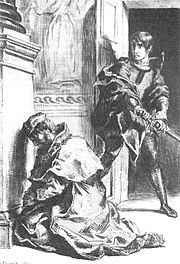햄릿/클로디어스/폴로니어스 편집증(정신장애 paranoid)의 원인과 영향
에세이 영어로 쓰기.
Cause 원인과 Effect영향 고치려고 노력하는 솔루션 등을 paragraph에 넣고있거든요.
영어로써야하는건데
우선은 한국말 먼저 알아야 .
원인과 고치려고 노력하는 그런 점들, 그리고 Example.
햄릿은 편집증이 정말 왜생긴걸까요?
유령이 나타나서? 오직?
클로디어스는 킹을 죽였다는 압박감에?
폴로니어스는 오필리어가 임신했고, 레어티즈도 이상하고
자기자식에대한 문제때문등..
Psychoanalytic

Since the birth of psychoanalysis in the late 19th century, Hamlet has been the source of such studies, notably by Sigmund Freud, Ernest Jones, and Jacques Lacan, which have influenced theatrical productions.
In his The Interpretation of Dreams (1900), Freud's analysis starts from the premise that "the play is built up on Hamlet's hesitations over fulfilling the task of revenge that is assigned to him; but its text offers no reasons or motives for these hesitations".[84] After reviewing various literary theories, Freud concludes that Hamlet has an "Oedipal desire for his mother and the subsequent guilt [is] preventing him from murdering the man [Claudius] who has done what he unconsciously wanted to do".[85] Confronted with his repressed desires, Hamlet realises that "he himself is literally no better than the sinner whom he is to punish".[84] Freud suggests that Hamlet's apparent "distaste for sexuality"—articulated in his "nunnery" conversation with Ophelia—accords with this interpretation.[86][87] John Barrymore introduced Freudian overtones into his landmark 1922 production in New York, which ran for a record-breaking 101 nights.
In the 1940s, Ernest Jones—a psychoanalyst and Freud's biographer—developed Freud's ideas into a series of essays that culminated in his book Hamlet and Oedipus (1949). Influenced by Jones's psychoanalytic approach, several productions have portrayed the "closet scene",[88] where Hamlet confronts his mother in her private quarters, in a sexual light. In this reading, Hamlet is disgusted by his mother's "incestuous" relationship with Claudius while simultaneously fearful of killing him, as this would clear Hamlet's path to his mother's bed. Ophelia's madness after her father's death may also be read through the Freudian lens: as a reaction to the death of her hoped-for lover, her father. She is overwhelmed by having her unfulfilled love for him so abruptly terminated and drifts into the oblivion of insanity.[89] In 1937, Tyrone Guthrie directed Laurence Olivier in a Jones-inspired Hamlet at the Old Vic.[90]
In the 1950s, Lacan's structuralist theories about Hamlet were first presented in a series of seminars given in Paris and later published in "Desire and the Interpretation of Desire in Hamlet". Lacan postulated that the human psyche is determined by structures of language and that the linguistic structures of Hamlet shed light on human desire.[85] His point of departure is Freud's Oedipal theories, and the central theme of mourning that runs through Hamlet.[85] In Lacan's analysis, Hamlet unconsciously assumes the role of phallus—the cause of his inaction—and is increasingly distanced from reality "by mourning, fantasy, narcissism and psychosis", which create holes (or lack (manque)) in the real, imaginary, and symbolic aspects of his psyche.[85] Lacan's theories influenced literary criticism of Hamlet because of his alternative vision of the play and his use of semantics to explore the play's psychological landscape.[85]
한번 읽어보세요..
햄릿을 보고 정신학적으로 분석한 사람들에 대한 글이예요..
여기서는 오딧세이 컴플렉스나 나르시즘으로 설명하고 있어요..
'♧전공,필,선♧ > 哲學.心理學' 카테고리의 다른 글
| VT총기참사 파장 - 이시형 박사가 분석한 조승희 (0) | 2009.10.27 |
|---|---|
| 편집증과 망상 (0) | 2009.10.27 |
| 정신병 가운데 가장 드문 것이 편집증이다.다른 정신병들은 여러가지 병리 (0) | 2009.10.27 |
| 심리상담과 정신과 치료과 다른 점 (0) | 2009.10.05 |
| 게슈탈트 치료의 이론적 배경 (0) | 2009.10.05 |